Recommendation Letter For Medical Student
[Your Name]
[Your Title/Position]
[Your Institution/Organization]
[Your Contact Information]
[Date]
[Recipient's Name]
[Recipient's Title/Position]
[Medical School's Name]
[Address of Medical School]
[City, State, ZIP Code]
Dear [Recipient's Name],
I am writing this letter in enthusiastic support of [Student's Full Name], who is a remarkable and dedicated medical student under my guidance at [Your Institution/Organization]. I am confident that [he/she] would be an outstanding addition to your esteemed medical program at [Medical School's Name].
I have had the privilege of mentoring [Student's First Name] over the past [duration] and have been continually impressed by [his/her] exceptional dedication, passion, and commitment to the field of medicine. [He/She] possesses a unique blend of academic excellence, exceptional interpersonal skills, and a strong work ethic.
Academically, [Student's First Name] has consistently demonstrated a deep understanding of medical concepts and has excelled in both coursework and clinical rotations. [His/Her] ability to critically analyze complex medical scenarios and apply theoretical knowledge to practical situations is truly commendable. [He/She] actively seeks opportunities to expand [his/her] medical knowledge and is always eager to engage in meaningful discussions on medical advancements and clinical techniques.
What sets [Student's First Name] apart is [his/her] exceptional bedside manner and interpersonal skills. [He/She] establishes an instant rapport with patients, creating a comfortable and reassuring environment. [His/Her] compassion, empathy, and effective communication skills contribute significantly to patient care and recovery. [Student's First Name] consistently receives positive feedback from both patients and colleagues alike, which underscores [his/her] ability to work collaboratively in a healthcare team.
Beyond [his/her] academic and interpersonal strengths, [Student's First Name] is a true leader and a proactive contributor to our medical community. [He/She] has actively participated in medical research projects, contributing to [his/her] growth as a critical thinker and problem solver. [His/Her] initiative and willingness to take on additional responsibilities are truly impressive, and I have no doubt that [he/she] will continue to excel in any challenges [he/she] undertakes.
In conclusion, I wholeheartedly recommend [Student's Full Name] for admission to [Medical School's Name]. [His/Her] dedication, academic excellence, interpersonal skills, and leadership qualities make [him/her] an ideal candidate who will undoubtedly contribute positively to your medical program and the broader medical community. I am confident that [Student's First Name] has the potential to become an exceptional physician and a credit to your institution.
Please feel free to contact me at [Your Email Address] or [Your Phone Number] if you require any further information regarding [Student's Full Name] or my recommendation.
Sincerely,
[Your Signature]
[Your Typed Name]
[Your Title/Position]
[Your Institution/Organization]
[Your Contact Information]
Residency Application Letter
Dear Dr. [Program Director's Name],
I am writing to enthusiastically recommend [Student Name] for your [Specialty] residency program at [Hospital/Institution Name]. As [Your Title] at [Your Institution], I have had the privilege of working closely with [Student Name] for [duration] during their [rotation/clerkship] in [department/specialty].
[Student Name] consistently demonstrated exceptional clinical acumen, compassionate patient care, and a genuine passion for [specialty]. During their time on our service, they managed complex cases with remarkable maturity, showing strong diagnostic reasoning and evidence-based decision-making skills. Their ability to synthesize information and present cases clearly impressed both faculty and peers.
Beyond clinical excellence, [Student Name] exhibits the professionalism, work ethic, and interpersonal skills essential for residency success. They collaborate effectively with multidisciplinary teams, communicate compassionately with patients and families, and maintain composure under pressure. Their intellectual curiosity drives them to pursue independent learning and contribute meaningfully to academic discussions.
[Student Name] would be an outstanding addition to your program. I give them my highest recommendation without reservation and am confident they will excel as a resident physician. Please feel free to contact me at [email] or [phone] if you need additional information.
Sincerely,
[Your Name, Credentials]
[Your Title]
[Department]
[Institution]
Research Fellowship Letter
Dear Selection Committee,
I am pleased to write this letter recommending [Student Name] for the [Research Fellowship Name] at [Institution]. As their research mentor and [Your Title] at [Your Institution], I have supervised [Student Name]'s work on [project/topic] for the past [duration], and I am continually impressed by their scientific rigor and innovative thinking.
[Student Name] joined our laboratory with strong foundational knowledge and quickly mastered complex techniques including [specific methods]. Their project investigating [research topic] has yielded significant findings, including [achievement/publication/presentation]. What distinguishes [Student Name] is their ability to think critically about experimental design, troubleshoot independently, and interpret results within broader scientific contexts.
Their contribution extends beyond technical skills. [Student Name] demonstrates initiative in literature review, proposes creative solutions to research challenges, and collaborates productively with team members. They have presented their work at [conferences/seminars], receiving positive feedback from senior investigators. Their manuscript on [topic] is currently under review at [journal].
[Student Name] possesses the intellectual curiosity, perseverance, and analytical skills necessary for a successful research career. This fellowship would provide ideal opportunities to further develop their expertise in [area]. I strongly support their application and believe they will make substantial contributions to your research program.
Please contact me at [email] if I can provide further details about [Student Name]'s qualifications.
Sincerely,
[Your Name, Credentials]
[Your Title and Department]
[Institution]
Scholarship Application Letter
To the Scholarship Committee,
It is my genuine pleasure to recommend [Student Name] for the [Scholarship Name]. As [Your Title] at [Institution], I have known [Student Name] for [duration] in my capacity as their [course instructor/academic advisor/mentor], and I can confidently attest to their exceptional qualifications and potential.
[Student Name] ranks among the top students I have encountered in my [number] years of medical education. They achieved [specific grades/honors] in my [course name], demonstrating not only mastery of content but also the ability to apply knowledge to complex clinical scenarios. Their performance on [specific assessments/presentations] showcased analytical thinking and comprehensive understanding that exceeded expectations.
What truly sets [Student Name] apart is their commitment to serving underserved communities and advancing health equity. They have volunteered [hours/activities] with [organizations], showing dedication that goes beyond curriculum requirements. Their leadership in [student organization/initiative] has positively impacted our academic community and demonstrated maturity beyond their years.
Despite facing [personal challenges, if applicable], [Student Name] has maintained academic excellence while contributing meaningfully to research, clinical experiences, and community service. This scholarship would alleviate financial pressures and allow them to focus fully on their medical education and service goals.
[Student Name] embodies the qualities this scholarship seeks to support. I recommend them enthusiastically and without hesitation.
Respectfully,
[Your Name, Credentials]
[Your Title]
[Institution]
Professional Licensure Letter
To Whom It May Concern,
I am writing to support the medical licensure application of [Student Name]. As [Your Title] at [Institution], I have supervised [Student Name]'s clinical training from [start date] to [end date] and can verify their professional competence, ethical conduct, and suitability for independent medical practice.
During [Student Name]'s training under my supervision, they completed [number] hours of clinical work in [specialties/departments], demonstrating competency in patient evaluation, diagnosis, treatment planning, and procedural skills appropriate to their level of training. They consistently met or exceeded performance standards in clinical rotations, maintaining proficiency in [specific skills/competencies].
I can attest to [Student Name]'s professional behavior and ethical conduct. They have shown unwavering commitment to patient safety, maintained appropriate boundaries, protected patient confidentiality, and communicated effectively with colleagues and patients. I have never witnessed or received reports of unprofessional behavior, substance abuse, or ethical violations during their time under my supervision.
[Student Name] possesses the knowledge, skills, and professional attributes necessary for safe and effective medical practice. They demonstrate sound clinical judgment, recognize their limitations, and seek appropriate consultation when needed. I have no reservations about their ability to practice medicine independently.
Based on my direct observation and supervision, I fully support [Student Name]'s application for medical licensure. Please contact me at [email] or [phone] if you require additional information.
Sincerely,
[Your Name, Credentials]
[Your Title]
[Institution]
[License Number]
Away Rotation Application Letter
Dear Dr. [Rotation Director's Name],
I am delighted to recommend [Student Name] for an away rotation in [Specialty] at [Institution Name]. As [Your Title] and [Student Name]'s academic advisor at [Home Institution], I have followed their progress throughout medical school and am impressed by their clinical abilities, professionalism, and dedication to [specialty].
[Student Name] has excelled academically, earning [honors/grades] and demonstrating particular strength in [relevant subjects]. During their core clerkship in [specialty], they received outstanding evaluations, with faculty noting their [specific strengths]. Their clinical skills, medical knowledge, and ability to function effectively in fast-paced environments make them well-prepared for this rotation.
Beyond academic performance, [Student Name] shows maturity, reliability, and strong work ethic. They adapt quickly to new environments, collaborate effectively with teams, and represent our institution professionally. Their interest in [specialty] is genuine and well-informed, supported by [research/extracurriculars/volunteer work] in this field.
An away rotation at your prestigious program would provide [Student Name] valuable exposure to [specific aspects] and help them determine if your residency program aligns with their career goals. I am confident they will contribute positively to your team and make the most of this learning opportunity.
I recommend [Student Name] without reservation for this away rotation. Please feel free to contact me at [email] or [phone] for any additional information.
Best regards,
[Your Name, Credentials]
[Your Title]
[Institution]
Academic Award Nomination Letter
Dear Awards Committee,
I am honored to nominate [Student Name] for the [Award Name]. As [Your Title] at [Institution], I have worked closely with [Student Name] as their [mentor/instructor/supervisor] and witnessed firsthand the exceptional qualities that make them deserving of this recognition.
[Student Name]'s academic achievements are outstanding. They have maintained a [GPA/class ranking] while taking on challenging coursework and scoring in the [percentile] on [Step exams]. However, what truly distinguishes [Student Name] is how they balance academic excellence with meaningful contributions to research, clinical care, teaching, and community service.
In research, [Student Name] has [authored publications/presented at conferences/contributed to projects], showing intellectual curiosity and scientific rigor. Clinically, they receive consistently stellar evaluations for [specific skills/qualities]. As a peer tutor/teaching assistant, they have helped numerous struggling students succeed, demonstrating generosity and leadership. Their volunteer work with [organizations] reflects genuine commitment to service.
[Student Name] embodies the values this award celebrates: academic excellence, professional integrity, compassionate care, and dedication to advancing medicine. Colleagues and patients alike describe them as [positive qualities], and their positive impact on our academic community is undeniable.
It would be difficult to identify a more deserving candidate. [Student Name] represents the best of medical education, and I nominate them with the highest enthusiasm.
Sincerely,
[Your Name, Credentials]
[Your Title]
[Institution]
Character Reference Letter (Formal)
To Whom It May Concern,
I am writing to provide a character reference for [Student Name], whom I have known for [duration] in my capacity as [Your Title] at [Institution]. I am pleased to speak to their personal character, integrity, and suitability for [purpose of letter].
Throughout our association, [Student Name] has consistently demonstrated honesty, reliability, and strong moral character. They approach responsibilities with seriousness and follow through on commitments. I have observed them handle challenging situations with maturity, maintain composure under stress, and treat others with respect and dignity regardless of circumstance.
[Student Name] shows excellent judgment in both professional and personal matters. They maintain appropriate boundaries, respect confidentiality, and conduct themselves ethically in all interactions. Their colleagues and supervisors describe them as trustworthy, dependable, and professional. I have never had reason to question their integrity or character.
In addition to their professional qualities, [Student Name] contributes positively to their community through [volunteer work/activities]. They demonstrate empathy, cultural sensitivity, and genuine interest in helping others. These personal attributes complement their professional capabilities and speak to their overall character.
I have no hesitation in providing this character reference for [Student Name]. They possess the personal integrity, ethical conduct, and professional demeanor that merit your confidence. Please contact me at [email] or [phone] if you require additional information.
Respectfully,
[Your Name, Credentials]
[Your Title]
[Institution]
Dean's Letter Supplement (Informal)
Dear Program Director,
I wanted to reach out personally regarding [Student Name]'s application to your program. While the Dean's letter provides a comprehensive overview of their performance, I felt it important to add my perspective as someone who has worked directly with [Student Name] during [specific rotation/experience].
[Student Name] is truly special. Beyond the excellent grades and test scores, they bring something intangible to patient care – a genuine warmth and ability to connect that puts patients at ease even in difficult moments. I've watched them comfort anxious families, explain complex diagnoses in understandable terms, and advocate for patients who couldn't speak for themselves.
What struck me most during our time together was [Student Name]'s resilience and growth mindset. When they struggled with [specific challenge], rather than becoming discouraged, they sought feedback, worked with tutors, and ultimately mastered the material. This ability to learn from difficulty and persist through challenges will serve them well in residency.
[Student Name] would thrive in your program. They're not just seeking prestige – they've done their homework about your training philosophy, faculty interests, and patient population. Their career goals align genuinely with what your program offers.
I'm happy to discuss [Student Name] further if helpful. I think you'd be fortunate to have them.
Warm regards,
[Your Name]
[Your Title]
What is a Recommendation Letter for Medical Students and Why is it Important?
A recommendation letter for medical students is a formal document written by physicians, faculty members, researchers, or other professionals who can attest to a student's clinical abilities, academic performance, personal character, and professional potential. These letters serve as critical third-party evaluations that provide admissions committees, licensing boards, and selection panels with insights beyond what transcripts and test scores reveal.
The purpose extends beyond simple endorsement. Strong recommendation letters:
- Provide concrete examples of clinical competence and patient care abilities
- Verify professional behavior and ethical conduct observed directly
- Contextualize academic achievements within real-world performance
- Highlight unique qualities and potential that distinguish the candidate
- Offer credible assessment from experienced medical professionals
- Address weaknesses or gaps constructively when necessary
- Demonstrate the recommender's confidence in the candidate's future success
These letters carry substantial weight because they come from individuals who have supervised the student's actual performance in clinical, research, or academic settings, offering perspective that candidates cannot provide themselves.
Who Should Write Recommendation Letters for Medical Students?
The ideal recommender depends on the letter's purpose, but generally should be someone with:
- Direct supervisory experience with the student for meaningful duration
- Relevant credentials appropriate to the application context
- Strong writing skills to articulate observations effectively
- Positive assessment based on actual performance
- Professional standing that lends credibility to their endorsement
Specific Recommender Types:
- Attending physicians who supervised clinical rotations (especially in the relevant specialty)
- Clerkship directors who can speak to overall performance during core rotations
- Research mentors (PhD or MD) who supervised laboratory or clinical research
- Department chairs for particularly distinguished students
- Program directors from the student's home institution
- Academic advisors who have followed the student's progress longitudinally
- Community physicians from volunteer clinics or preceptorships
Avoid recommenders who barely know the student, cannot provide specific examples, or might write lukewarm letters. A strong letter from an assistant professor who worked closely with you trumps a generic letter from a famous department chair who rarely saw you.
When Do Medical Students Need Recommendation Letters?
Medical students require recommendation letters at multiple critical junctures:
- Residency applications (typically 3-4 letters, submitted in September of 4th year)
- Away rotation applications (spring/summer of 3rd year)
- Research fellowships (throughout medical school)
- Scholarship applications (any year, various deadlines)
- Academic awards and honors (as announced by institutions)
- Medical licensure applications (4th year and beyond)
- Gap year positions (research, clinical, public health roles)
- Transfer applications to other medical schools
- Competitive subspecialty positions or combined degree programs
- International rotations or exchanges
- Leadership positions in student organizations
- Professionalism committee hearings (character references if needed)
The most intense period is 4th year when students apply for residency through ERAS (Electronic Residency Application Service), which typically opens mid-September. Letters should be ready by early September to ensure timely application submission.
Requirements and Prerequisites Before Requesting a Letter
Before approaching potential recommenders, students should:
- Complete substantive work with the recommender (minimum 4 weeks for clinical rotations)
- Perform exceptionally to warrant a strong endorsement
- Identify appropriate recommenders based on specialty and letter requirements
- Research program requirements (some specialties require specific letter types)
- Prepare supporting materials including CV, personal statement draft, transcript
- Understand timing and allow adequate notice (minimum 4-6 weeks)
- Verify contact information and preferred method of communication
- Secure permission before listing someone as a recommender
- Clarify expectations about letter strength (directly ask if they can write a strong letter)
- Provide deadline information and submission instructions clearly
Materials to Provide Recommenders:
- Updated curriculum vitae highlighting relevant experiences
- Personal statement or career goals summary
- List of programs/opportunities being applied to
- Specific qualities or experiences you'd like highlighted
- Transcript (unofficial is fine)
- Details about your time working together to jog their memory
- Deadline information and submission platform details
- ERAS token or link for direct upload (for residency letters)
How to Write and Request a Recommendation Letter
For Students Requesting Letters:
- Request early – minimum 4-6 weeks before deadline, ideally 8-12 weeks
- Ask in person when possible, follow up via email with written details
- Provide comprehensive packet with all necessary information
- Give specific examples of cases or experiences to jog recommender's memory
- Explain the opportunity and why you're interested
- Offer to draft bullet points or talking points (but never write the full letter yourself)
- Send reminders politely as deadline approaches (2 weeks, 1 week, 3 days)
- Express gratitude immediately and after submission
- Update recommenders on outcomes when appropriate
For Recommenders Writing Letters:
- Agree only if you can write strongly – declining is better than damning with faint praise
- Review provided materials thoroughly before writing
- Use specific examples rather than generic praise
- Address required competencies for the target program/specialty
- Be honest but constructive about limitations
- Compare to peers when possible ("top 5% of students I've supervised")
- Explain your qualifications to evaluate the student
- Proofread carefully for errors and clarity
- Submit before deadline using the specified platform
- Keep a copy for potential follow-up questions or additional submissions
Letter Formatting and Structural Elements
Essential Components:
- Professional letterhead with institution name, logo, and contact information
- Date of letter composition
- Salutation (specific name when possible, "Dear Program Director" if not)
- Introduction stating your relationship, credentials, and context
- Body paragraphs organized by competency or theme
- Specific examples demonstrating claims with concrete scenarios
- Comparative statements placing student among peers
- Conclusion with clear recommendation strength
- Signature block with credentials, title, contact information
Optimal Length and Style:
- One full page (approximately 400-600 words) for most purposes
- Up to two pages for highly competitive positions or extensive relationships
- Professional tone but personable, not overly formal or stiff
- Active voice and confident language
- Avoid clichés and overused phrases
- Vary sentence structure for readability
- Quantify achievements when possible
- Use specialty-specific language appropriately for the target audience
Submission Format:
Most letters are submitted electronically through ERAS, scholarship portals, or email. Ensure PDF format for consistency, use institution letterhead, and include electronic signature or scanned signature.
Common Mistakes to Avoid
For Students:
- Waiting until the last minute to request letters
- Choosing recommenders who barely know you
- Failing to waive rights to view letters (appears distrustful)
- Not providing adequate information to recommenders
- Requesting too many letters from the same department
- Neglecting to follow specialty-specific letter requirements
- Forgetting to send reminders as deadlines approach
- Not expressing gratitude appropriately
- Submitting generic letters not tailored to specialty
For Recommenders:
- Writing generic letters without specific examples
- Including damning praise ("adequate," "satisfactory," "good student")
- Discussing legally protected characteristics inappropriately
- Exceeding appropriate length (more than 2 pages)
- Missing submission deadlines
- Recycling old letters without updating dates or details
- Including inaccurate information or misremembering details
- Writing letters for students you don't know well
- Focusing only on grades rather than clinical competence
- Using ambiguous language that signals hidden concerns
- Discussing personal information unrelated to professional qualification
- Failing to address red flags appropriately when they exist
Tips, Best Practices, and Insider Secrets
- The "top 5%" mention – Comparative rankings carry enormous weight
- Choose specialty-appropriate recommenders – letters from within your intended specialty are crucial
- One "wildcard" letter works – a unique perspective (research mentor, community physician) adds depth
- Request before rotation ends – recommenders remember details better immediately after working together
- The personal touch matters – handwritten thank-you notes stand out
- Update recommenders annually – maintain relationships for future opportunities
- Strong verbs create impact – "excelled," "demonstrated mastery," "consistently distinguished"
- Anecdotes trump generalizations – specific patient interactions are memorable
- Address concerns head-on – if there's a weakness, a letter can contextualize it
- ERAS timing is critical – letters can be updated until interview offers are made
- Quality over quantity – four strong letters beat six mediocre ones
- Geographic connections help – a recommender with ties to your target program can mention it
- Research accomplishments impress – publications and presentations significantly strengthen letters
- The concluding sentence matters – "highest recommendation without reservation" is the gold standard
How Many Recommendation Letters Do You Need?
The required number varies by context:
Residency Applications:
- Minimum: 3 letters (ERAS allows up to 4 per specialty)
- Recommended: 3-4 strong letters
- Specialty-specific: Some require letters from specific specialties (e.g., ophthalmology wants one from an ophthalmologist)
Scholarships and Fellowships:
- Typically: 2-3 letters depending on award prestige
- Research fellowships: Often require 2 from research mentors
Away Rotations:
- Usually: 1 letter from a clinical supervisor or dean
Medical Licensure:
- Varies by state: 1-3 letters attesting to character and clinical competence
Strategic Approach:
Collect more letters than required during medical school (5-6 total) to have options. Different applications may benefit from different letter combinations. Some recommenders may not submit on time, so having backups is wise.
After Sending: Follow-Up and Next Steps
Immediate Actions:
- Send thank-you note within 24-48 hours of submission
- Confirm receipt through the submission portal
- Track submission status in ERAS or other platforms
- Notify recommenders once letter appears as received
During Application Season:
- Update recommenders on interview invitations (brief email is appropriate)
- Share major outcomes like match results or award receipt
- Request additional submissions if applying to more programs (provide updated list)
- Respond promptly if programs contact recommenders directly
Long-Term Maintenance:
- Send annual updates with brief career progress summary
- Maintain professional relationship for future opportunities
- Write LinkedIn recommendations for recommenders when appropriate
- Pay it forward by writing strong letters for students once you're in position to do so
No Follow-Up Needed:
Recommendation letters typically don't require confirmation from recipients. The submission platform confirms receipt, and programs won't notify recommenders individually.
Comparing Recommendation Letters to Other Application Components
Letters vs. Personal Statements:
- Letters: Third-party validation, objective assessment, describe what others observe
- Statements: Self-advocacy, subjective narrative, explain motivations and goals
- Both needed: Letters verify what you claim; statements provide context
Letters vs. Transcripts:
- Letters: Qualitative assessment, contextualize performance, address intangibles
- Transcripts: Quantitative data, factual record, demonstrate consistency
- Advantage of letters: Can explain grade irregularities or highlight strengths not reflected numerically
Letters vs. CV:
- Letters: Assess quality and impact of experiences
- CV: List accomplishments and activities factually
- Letters add depth: Transform CV line items into meaningful narratives
Strong Letter vs. Committee Letter:
- Individual letters: Personal, specific, often more detailed
- Committee/Dean's letter: Comprehensive, standardized, required by some programs
- Both valuable: Committee letter provides overview; individual letters add depth
Alternative: Virtual Interviews:
Some programs now use video interviews as supplementary evaluation, but these complement rather than replace letters. Letters remain irreplaceable for providing longitudinal assessment from credible evaluators.
Advantages and Disadvantages of Recommendation Letters
Advantages:
- Provide objective third-party validation of abilities
- Offer concrete examples of clinical performance
- Contextualize academic record within real-world settings
- Highlight qualities not captured by grades or test scores
- Demonstrate professional relationships and networking
- Explain or mitigate weaknesses when appropriate
- Carry credibility from experienced professionals
- Required component for virtually all applications
Disadvantages:
- Students cannot control content or quality
- Risk of weak or damaging letters if recommender chosen poorly
- Time-consuming for recommenders (may delay submissions)
- Potential for implicit bias in evaluation and language
- Limited ability to verify authenticity or accuracy
- Generic letters provide little differentiation
- Difficult to request from intimidating or busy faculty
- Cannot waive review rights without appearing distrustful
- Create burden on faculty who write hundreds of letters
Mitigating Disadvantages:
Choose recommenders carefully, provide comprehensive materials, maintain professional relationships, request early, and consider the risk-benefit before asking someone who may not write strongly.
Does a Recommendation Letter Require Attestation or Authorization?
Standard Practice:
Most recommendation letters do not require notarization or formal attestation. The recommender's signature, credentials, and institutional affiliation serve as authentication.
Exceptions Requiring Additional Verification:
- Medical licensure applications: Some state boards require recommenders to provide their license numbers and may verify credentials
- International applications: Foreign medical boards may require notarization or apostille certification
- Background checks: Letters addressing character or ethical conduct may need to be submitted on official letterhead with verification
- Legal proceedings: Character references for professionalism hearings may require sworn statements
Electronic Signatures:
Most platforms (ERAS, scholarship portals) accept electronic signatures. Recommenders should:
- Use institutional email addresses for credibility
- Submit through official channels rather than having students forward
- Include contact information for verification if needed
- Sign with full credentials and title
Right to Review:
Students applying through ERAS should waive their right to view letters. Programs view non-waived letters skeptically, assuming they may be less candid. This waiver serves as a form of authentication, indicating the letter represents the recommender's true assessment.

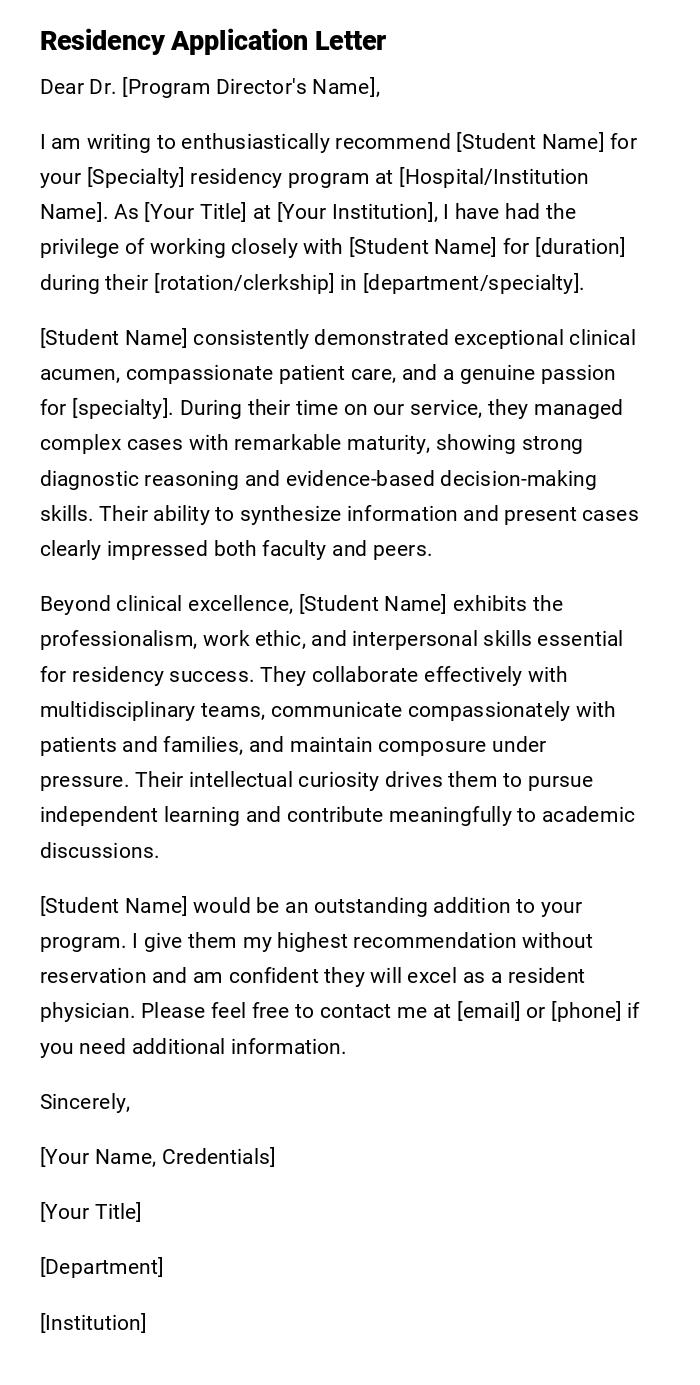
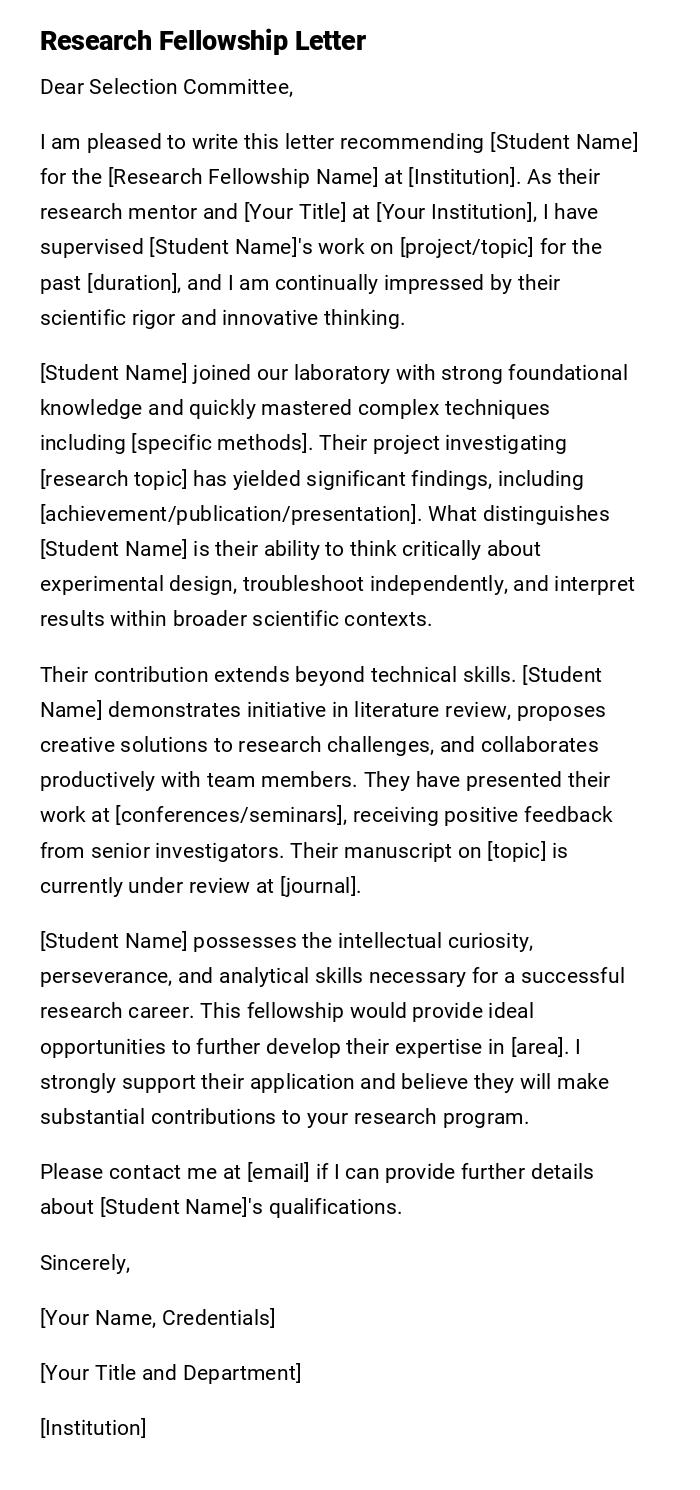
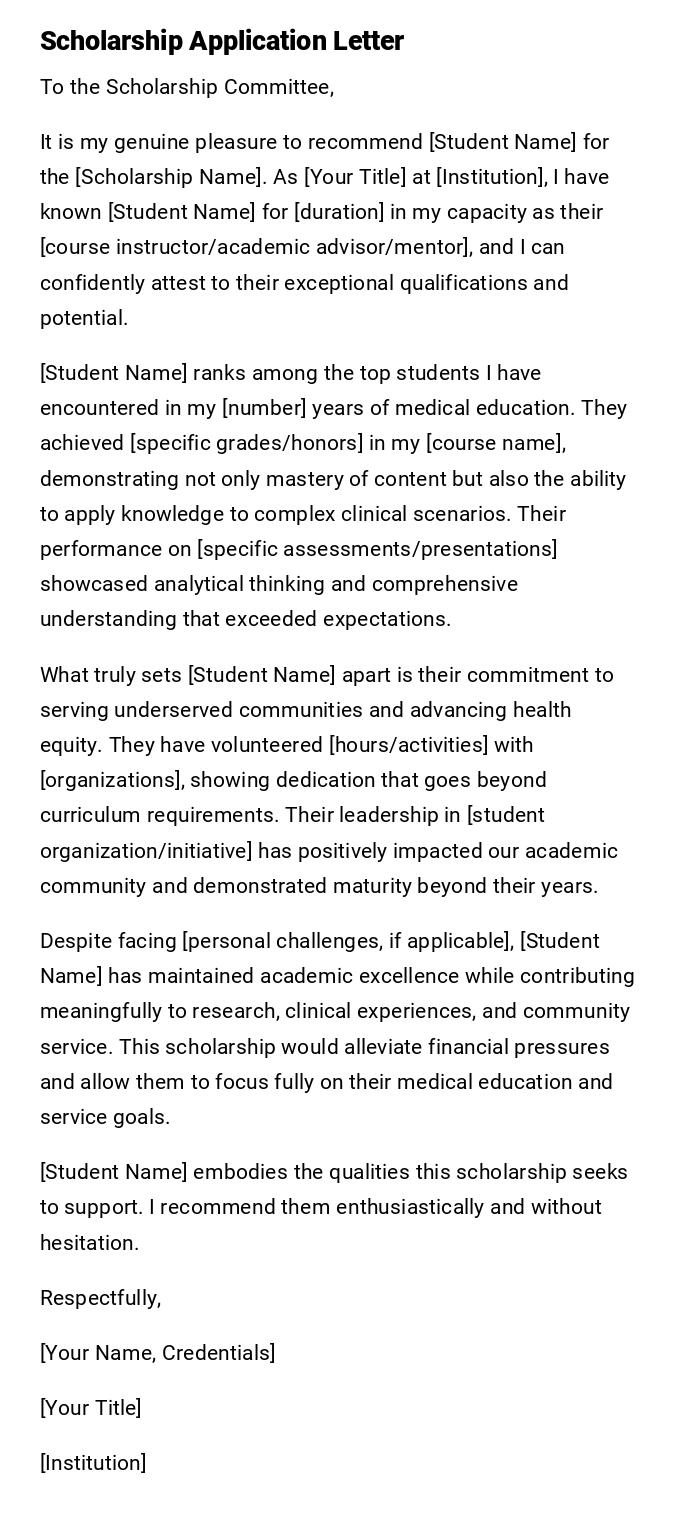
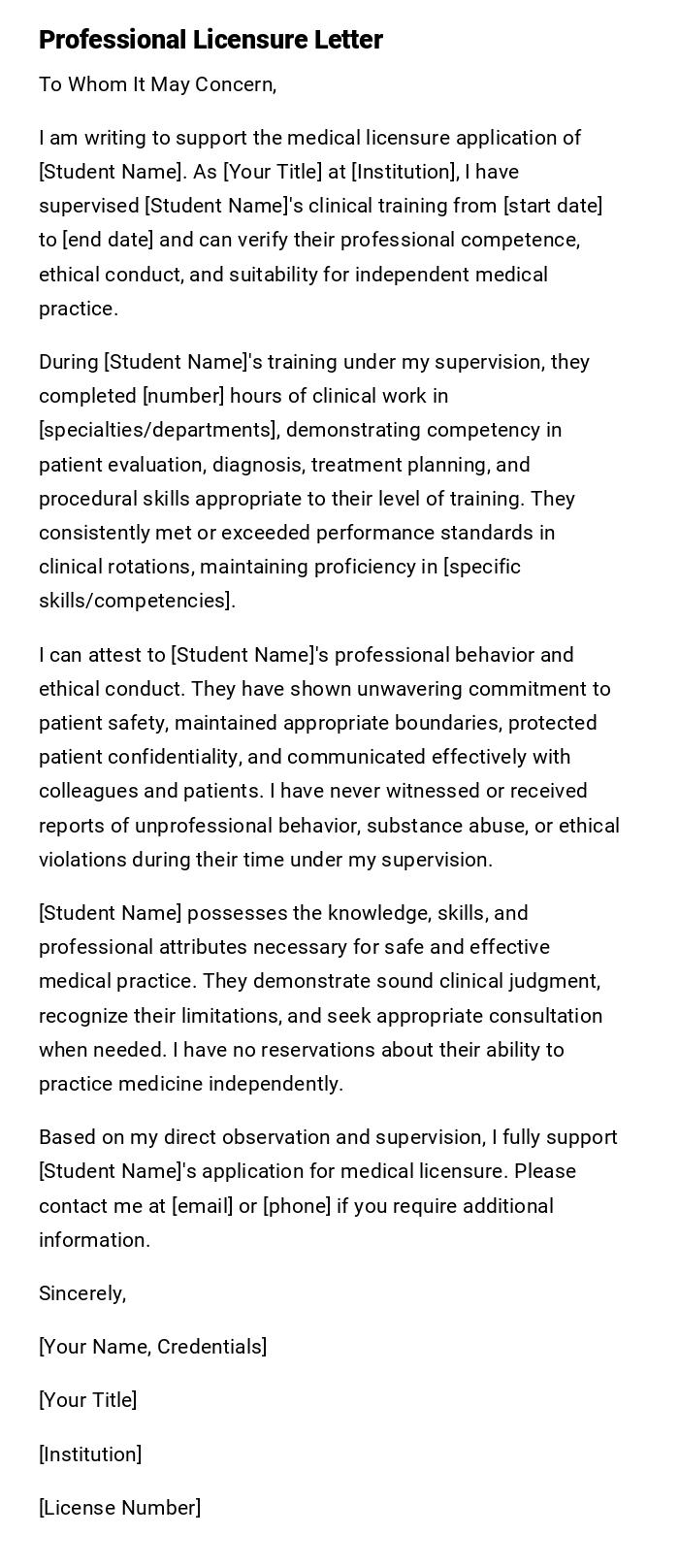
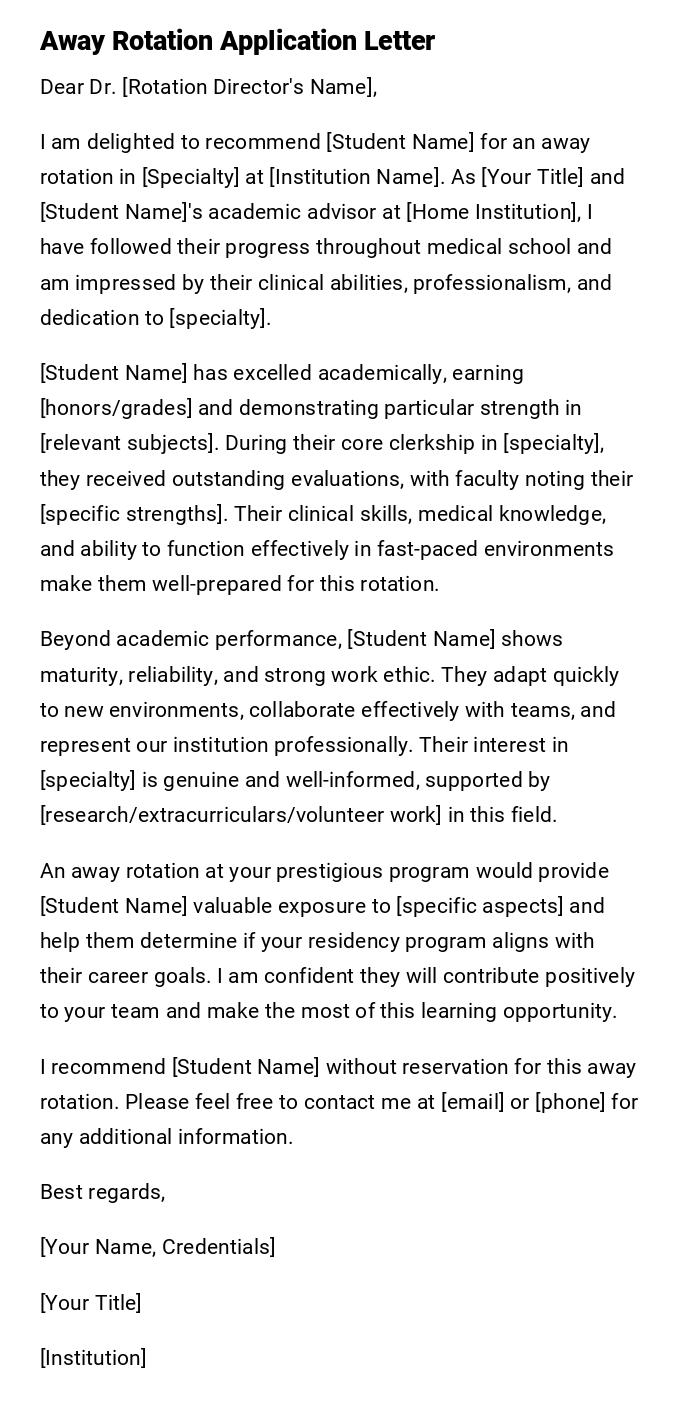
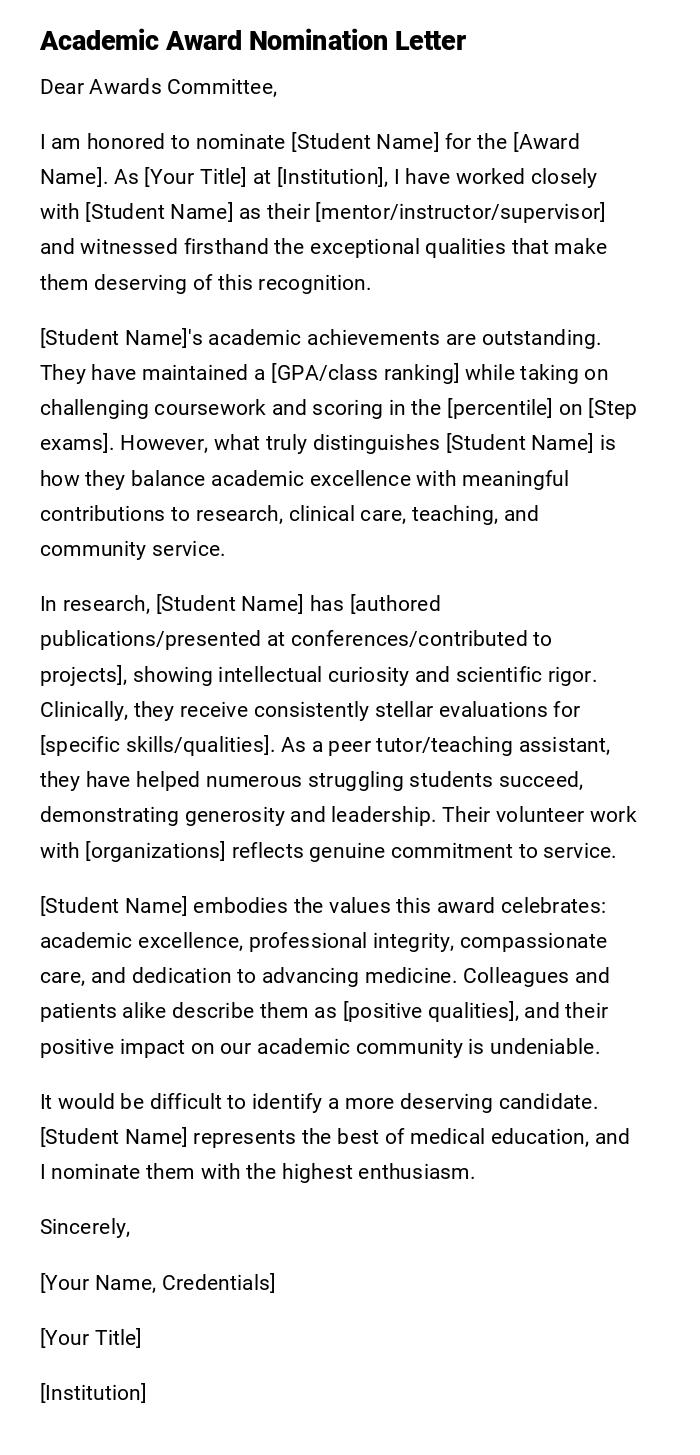
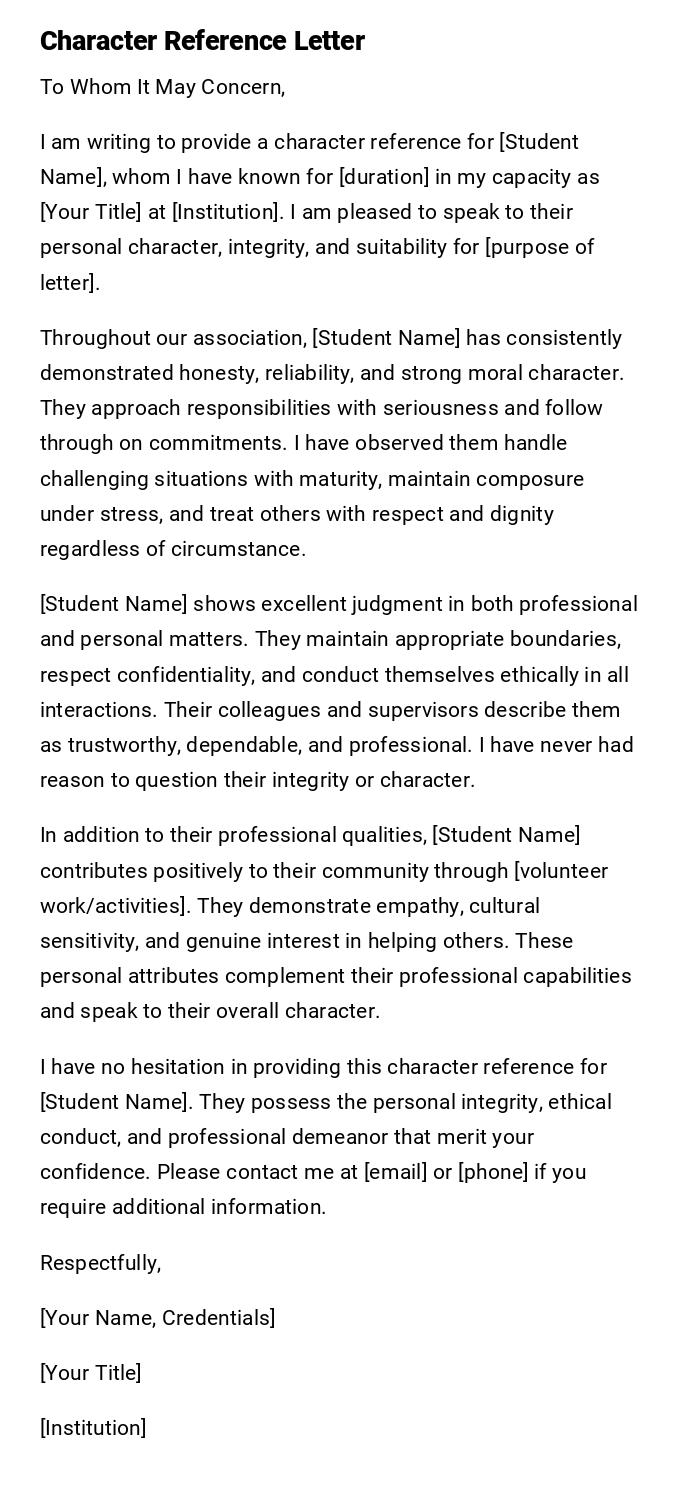
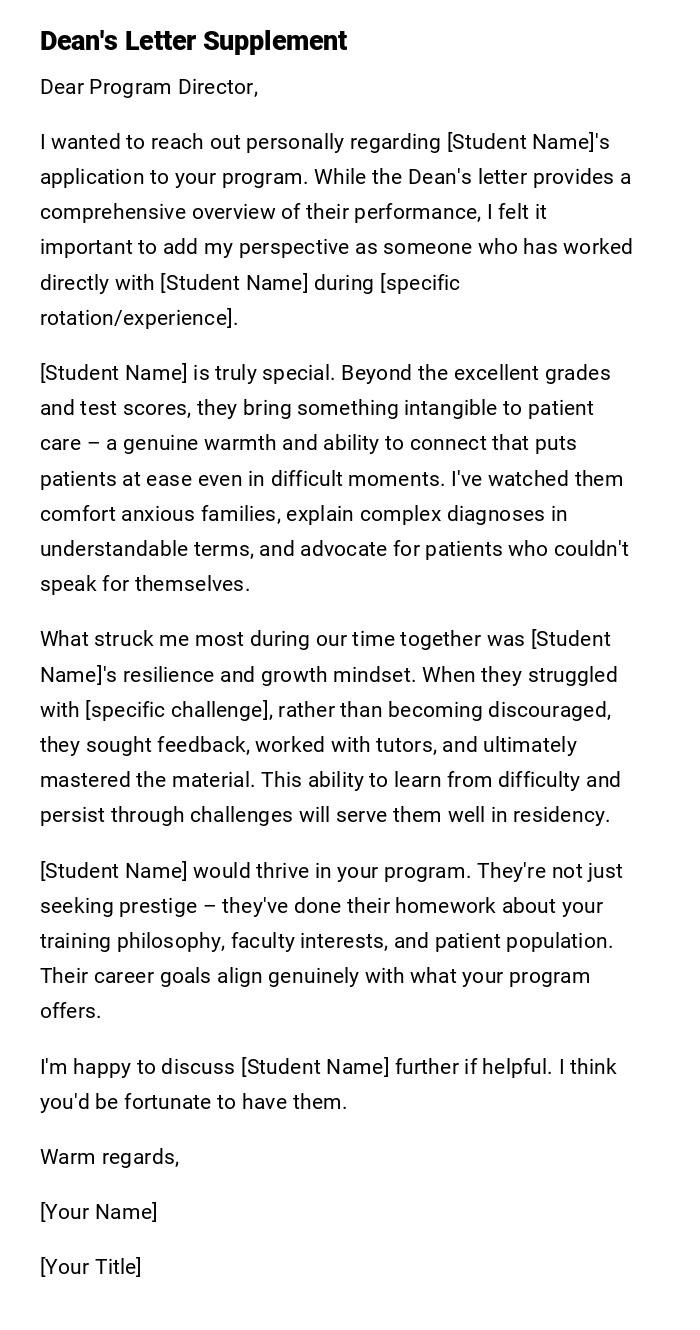

 Download Word Doc
Download Word Doc
 Download PDF
Download PDF